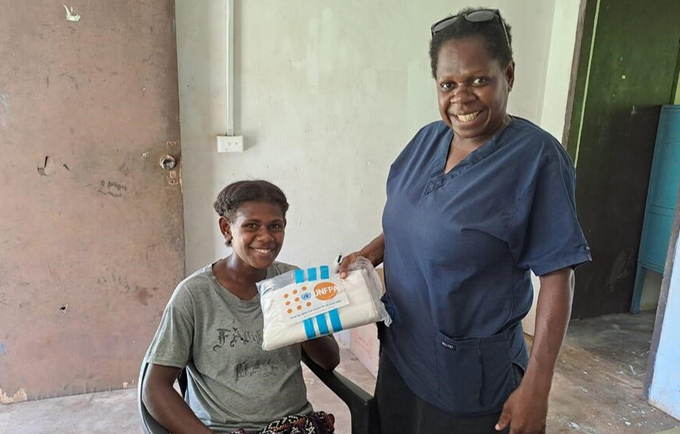Erromango Island, Tafea Province, Vanuatu - “The ‘Clean Delivery Kits’ are very useful during emergencies for the pregnant women who live in rural and remote communities and cannot access services in a timely manner,” said Ms. Elvie Naki, a midwife in Vanuatu, as she distributed one of the emergency reproductive health kits to a 24-year-old mother who was six months pregnant with her third child. Despite working in a rural community in Erromango Island, 160 kilometers away from the capital Port Vila, Elvie can now feel assured that she has the necessary means to facilitate a safe and clean delivery. “The Clean Delivery Kits save the lives of mothers and newborn babies.”
Climate-induced disasters and other emergencies do not halt the natural pace of pregnancy or childbirth. The devastating duo of severe Category 4 Tropical Cyclones Judy and Kevin that hit Vanuatu one after another at the beginning of March this year, was not an exception. The Government estimates that, out of 300,000 plus population of the country, more than 130,000 have been affected, including some 32,500 women of reproductive age (15-49 years). There are close to 2,440 pregnant women among the affected, and some 270 live deliveries are expected each month.
All of these women and newborn babies need access to safe and clean delivery services, though TCs Judy and Kevin affected the already stretched workload of the local healthcare providers who attend to pregnant and lactating women, and also made it difficult for those women to access healthcare facilities, especially in remote communities such as Ipota Village on Erromango Island where Midwife Elvie is carrying out the community outreach services. The island belongs to Tafea Province, one of the worst affected provinces.
The United Nations Population Fund (UNFPA) Pacific with the support from the Vanuatu Ministry of Health’s Emergency Medical Team, has thus been distributing the emergency reproductive health kits to pregnant women, including in the outer islands of Tafea. Containing the most essential – a plastic sheet, a blanket, sterile gloves, soap, a razor blade, an umbilical cord tie, etc. – the Clean Delivery Kit (type 2A) helps pregnant women who are unable to get to a health facility during and aftermath of an emergency situation. Infection during childbirth is one of the leading causes of maternal deaths globally, and the Clean Delivery Kits significantly reduce the risks. The quick deployment and distribution of the life-saving reproductive health kits was made possible through UNFPA’s Regional Prepositioning Initiative funded by Australia’s Department of Foreign Affairs and Trade (DFAT).
UNFPA Pacific works closely with the national and local governments, other UN agencies, community organizations, the private sector, and many other partners to ensure the continuity of reproductive health services for women and girls during emergencies. No woman should die from giving birth, even when climate-induced disasters may increase risks.

